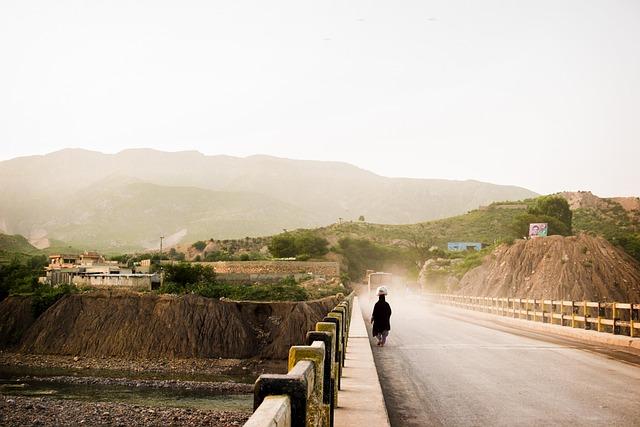In an increasingly interconnected world, where the echoes of diplomacy resonate across borders and cultural divides, Pakistan stands at a unique crossroads in the landscape of international relations. With a rich tapestry woven from centuries of history, diverse cultures, and pivotal geopolitical dynamics, the nation has become a significant player on the global stage. Yet, navigating the complexities of international diplomacy is no small feat. As regional tensions simmer and new alliances emerge, Pakistan faces a myriad of challenges—balancing its historical ties, economic aspirations, and security concerns. This article delves into the intricate role Pakistan plays in shaping global affairs, exploring the multifaceted relationships it fosters and the obstacles it must overcome. Join us as we unpack the nuances of Pakistan’s foreign policy, its strategic partnerships, and the broader implications for international relations in a rapidly evolving world.
Understanding Pakistans Strategic Position in Global Politics
Pakistan’s strategic position is shaped by a multitude of factors, making it a crucial player in regional and global politics. Geographically, it serves as a bridge between South Asia, Central Asia, and the Middle East, granting it significant geopolitical leverage. The country possesses critical access to vital shipping lanes, including those in the Arabian Sea, which are essential for trade and energy supplies. Moreover, its proximity to major powers, such as China and India, plays a pivotal role in its foreign relations and security dilemmas. Key aspects influencing Pakistan’s strategic dynamics include:
- Geographic Location
- Economic Ties to Major Powers
- Security Challenges and Partnerships
In light of current global shifts and rising tensions, Pakistan is increasingly maneuvering to maintain its influence while addressing internal challenges and external pressures. The complex relationship with neighboring India, especially regarding Kashmir, remains a focal point of its national policy. Meanwhile, ties with China have blossomed, illustrated by initiatives such as the China-Pakistan Economic Corridor (CPEC), which enhance economic cooperation and strategic alignment. The interplay of these factors demands a balanced approach in Islamabad’s diplomacy, ensuring that the nation can navigate the intricate web of international relations effectively. In the context of strategic partnerships, here are some pivotal alliances:
| Partner | Key Focus Areas | Impact on Relations |
|---|---|---|
| China | Infrastructure, Trade | Strong Economic Asset |
| United States | Counterterrorism, Aid | Fluctuating Ties |
| Saudi Arabia | Oil Supply, Defense | Energy Security |

Assessing Economic Collaborations and Regional Partnerships
As Pakistan seeks to bolster its position in the global arena, the assessment of economic collaborations and regional partnerships becomes paramount. The strategic location of Pakistan gives it a unique opportunity to serve as a conduit between Central Asia, South Asia, and the Middle East. Key partnerships are imperative for access to valuable trade routes and resources, establishing a network that not only enhances economic growth but also fortifies political alliances. Emphasizing cooperative frameworks, the country has initiated dialogues focused on joint ventures, such as:
- China-Pakistan Economic Corridor (CPEC) – A flagship project connecting Gwadar Port with China’s Xinjiang region.
- SAARC Initiatives – Collaborative efforts among South Asian nations aimed at fostering economic integration.
- Bilateral Trade Agreements – Enhancements with countries like Turkey and Iran to diversify trade partnerships.
However, navigating the complexities of these partnerships requires an understanding of regional dynamics and the influence of global economic trends. Disparities in development levels and conflicting interests can impede cooperation. To illustrate the potential and challenges of Pakistan’s economic initiatives, consider the following table showcasing major regional partnerships and their purpose:
| Partnership | Objective |
|---|---|
| China-Pakistan Economic Corridor | Infrastructure development and trade connectivity |
| Pakistan-Iran Trade Relations | Energy cooperation and market access |
| SAARC Economic Integration | Promoting regional trade and economic stability |

Addressing Security Concerns and Counterterrorism Efforts
Pakistan’s strategy in addressing security concerns has evolved significantly over the years, particularly in the context of rising global tensions and regional instability. The nation recognizes that to foster sustainable international relations, it must actively participate in multilateral forums aimed at counterterrorism. Key initiatives include enhancing intelligence sharing with allies, bolstering law enforcement capacities, and engaging in community-based counter-radicalization programs. Furthermore, Pakistan has committed to upgrading its border management systems to prevent the influx of extremist elements, reflecting a proactive rather than reactive stance in security management.
Efforts to counter terrorism are not only focused on immediate threats but also encompass long-term socio-economic strategies to eradicate the root causes of extremism. Pakistan emphasizes the importance of collaboration to combat radicalization through education, job creation, and promoting interfaith dialogue. Strategic partnerships are being forged with various countries, highlighting Pakistan’s role in countering global terrorist networks. These collaborations include:
- Joint military exercises to improve counterterrorism tactics.
- Capacity-building programs for local law enforcement agencies.
- Initiatives for community engagement and awareness-raising campaigns to build resilience against extremist ideologies.
In light of these strategies, the following table summarizes Pakistan’s collaborative efforts in counterterrorism:
| Partner Country | Collaboration Focus | Outcome |
|---|---|---|
| United States | Intelligence Sharing | Enhanced operational efficiency in targeting terrorist cells |
| China | Border Security Training | Improved surveillance and monitoring techniques |
| Saudi Arabia | Counter-Radicalization Programs | Successful engagements in community outreach |

Fostering Diplomatic Engagements for Sustainable Development
In today’s interconnected world, fostering strong diplomatic engagements is crucial for addressing the multifaceted challenges of sustainable development. Pakistan has the opportunity to leverage its unique geopolitical position to mediate and facilitate dialogues that focus on collaborative solutions. By aligning itself with global initiatives, such as the United Nations Sustainable Development Goals (SDGs), Pakistan can strengthen its role as a proactive player on the international stage. This requires a concerted effort to engage with diverse stakeholders, including governments, non-governmental organizations, and the private sector, fostering a culture of cooperation that transcends borders.
To effectively navigate the complexities of international relations, Pakistan must prioritize the following strategies:
- Diplomatic Dialogue: Establishing regular diplomatic channels to discuss mutual objectives and sustainable practices.
- Multilateral Collaboration: Participating in global forums to influence policy and share best practices.
- Knowledge Transfer: Facilitating exchanges in technology and expertise to enhance local capabilities towards sustainability.
By focusing on these areas, Pakistan can not only address pressing global issues but also foster a sustainable future for its own citizens. Below is a table highlighting the potential impact of diplomatic engagements:
| Engagement Area | Potential Impact |
|---|---|
| Climate Negotiations | Strengthens climate resilience efforts |
| Trade Partnerships | Enhances economic growth and job creation |
| Technology Transfer | Boosts innovation in sustainable practices |
Key Takeaways
As we draw the curtain on our exploration of “Navigating Challenges: Pakistan’s Role in Global International Relations,” it becomes evident that the path ahead is as intricate as the history it traverses. Pakistan, situated at the crossroads of significant geopolitical currents, finds itself in a unique position, balancing its domestic aspirations with the demands of a complex global landscape.
The interplay of regional dynamics, historical alliances, and emerging partnerships paints a nuanced picture of a nation striving to carve out its identity in the international arena. While challenges abound—ranging from economic hurdles to evolving security threats—there also lies a wealth of opportunities for meaningful engagement and cooperation.
In the tapestry of global relations, Pakistan’s narrative is one of resilience and potential, marked by the collective efforts of its people and leadership. As it continues to navigate its challenges, the country’s role will not only shape its own future but also influence the broader contours of international cooperation.
The journey is ongoing, and as the world watches, Pakistan’s commitment to dialogue, diplomacy, and development will be crucial in forging a prosperous and stable path forward. In this dynamic interplay of interests and ideals, only time will tell how successfully Pakistan will emerge as a key player on the global stage. However, one thing is certain: the resolve to navigate these challenges will define not just its destiny, but the future of global relations in an ever-evolving world.



